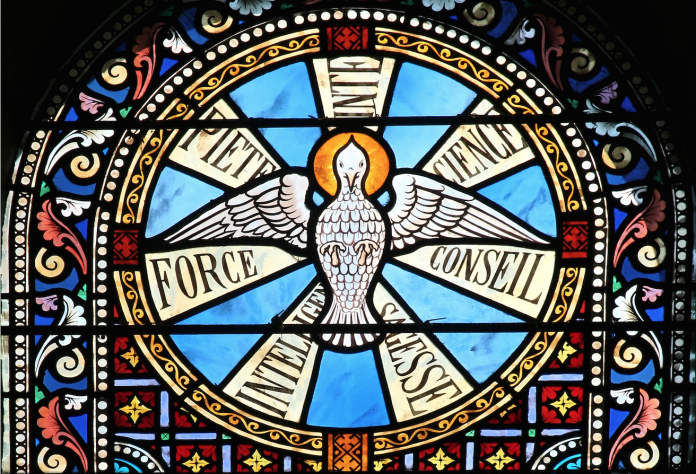
Activities to help learn about these gifts
JARED DEES
 Whether you are preparing your students for Confirmation or just wish to introduce them to the seven gifts of the Holy Spirit, here are some ideas for short activities. You can have your students do each one as a part of a single lesson or spread them out over a series of weeks to begin, end, or fill up extra time in your lessons. The hope with these activities is that your students will not only learn what each gift of the Holy Spirit means but also come to realize how God has personally bestowed on them some unique experience of the gift in their lives.
Whether you are preparing your students for Confirmation or just wish to introduce them to the seven gifts of the Holy Spirit, here are some ideas for short activities. You can have your students do each one as a part of a single lesson or spread them out over a series of weeks to begin, end, or fill up extra time in your lessons. The hope with these activities is that your students will not only learn what each gift of the Holy Spirit means but also come to realize how God has personally bestowed on them some unique experience of the gift in their lives.
The seven gifts of the Holy Spirit are wisdom, understanding, knowledge, counsel, fortitude, piety, and fear of the Lord. The following seven activities will help your students meditate on each one of these gifts.
Wisdom activity
With the gift of wisdom, we can think deeply about a situation, conflict, or experience and see things the way God sees them. Have the students pick a challenging situation in their lives or in the lives of people their age (fights with friends, test anxiety, sitting the bench on a sports team). Invite them to imagine what God might think about the situation. Have them write a letter from God’s perspective offering advice on how to think about overcoming the biggest challenges.
Follow up each of these activities with a prayer experience … ask for the Holy Spirit to bless them with each of the gifts.
Understanding activity
 With the gift of understanding, we experience a compassionate awareness of what others think and feel. Have the students make a list of all the people they have spoken to so far today. Next to each one of these names, have them write what emotions these acquaintances were experiencing and why they might feel that way. Then, at the bottom of the paper, have students write ways they might help one of the people on their list.
With the gift of understanding, we experience a compassionate awareness of what others think and feel. Have the students make a list of all the people they have spoken to so far today. Next to each one of these names, have them write what emotions these acquaintances were experiencing and why they might feel that way. Then, at the bottom of the paper, have students write ways they might help one of the people on their list.
Knowledge activity
With the gift of knowledge, we can make good decisions based on the in- formation we have at hand. Invite the students to think about a good deed they did recently for someone. For example, they might say: “I let my brother eat the last waffle.” Then, have  them create a true/ false quiz about the information they used to make this choice. Statements might be: “My mom will buy more at the store today” (true), or “I don’t like waffles” (false).
them create a true/ false quiz about the information they used to make this choice. Statements might be: “My mom will buy more at the store today” (true), or “I don’t like waffles” (false).
Counsel activity
With the gift of counsel (some- times called “right judgment”), we can make good decisions based on what is right and wrong. Have the students work in groups of three to create a skit about a common misbehavior among children their age (lying, gossiping, stealing). One student will be a person struggling to make a decision, and the other two students will act as an angel offering counsel about the right thing to do and a devil offering tempting advice about the wrong thing to do.
Fortitude activity
With the gift of fortitude, we experience the courage to overcome our fears. Students will imagine that they are kid superheroes with a superpower to help them overcome common fears among young people. Ask them to draw the superhero costume to show their superpower on a piece of paper, and then have them describe their superpower to the class and the fear it helps them overcome.
Piety activity
With the gift of piety, or rever- ence, we can worship God more meaningfully. Have students think about someone who has been a good example of piety in their lives. Have them write thank you notes to these people describing how they have lived as a holy example for the students at home, school, or in church.
Fear of the Lord activity
With the gift of the fear of the Lord, the Holy Spirit enables us to be in humble wonder and awe of God’s creation and of our relationship with him. On the left side of a piece of paper, have students write the words AWESOME or WONDER vertically on the page. Next to each letter, tell them to list words that describe things that amaze them with humility and love for God. Next to the “E,” for example, students might write eagles, Easter, education, entertainment, ecology, or elm trees.
Praying for the gifts of the Holy Spirit
Follow up each of these activities with a prayer experience in which the kids ask for the Holy Spirit to bless them with each of the gifts. This is an essential conclusion to each of these activities and the best way for them to personalize what they learn about the gifts.
Jared Dees is the creator of TheReligionTeacher.com, which offers hundreds of downloadable resources, including some videos and worksheets for Confirmation and the seven gifts of the Holy Spirit.
This article was originally published in Catechist magazine, October 2019
Image credit: iStock 668606380 and 91767447




